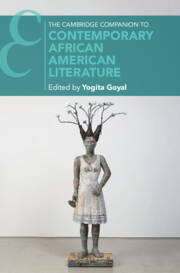Book contents
- The Cambridge Companion to Contemporary African American Literature
- The Cambridge Companion to Contemporary African American Literature
- Copyright page
- Contents
- Contributors
- Acknowledgments
- Chronology
- Introduction
- Part I Histories of the Present
- Part II African American Genres
- Part III Mapping New Identities and Geographies
- 10 Feminist Intersections
- 11 Queer Bodies in Time
- 12 Global and Diasporic Worldmaking
- Part IV Critical Approaches
- Further Reading
- Index
- Cambridge Companions To …
11 - Queer Bodies in Time
from Part III - Mapping New Identities and Geographies
Published online by Cambridge University Press: 14 December 2023
- The Cambridge Companion to Contemporary African American Literature
- The Cambridge Companion to Contemporary African American Literature
- Copyright page
- Contents
- Contributors
- Acknowledgments
- Chronology
- Introduction
- Part I Histories of the Present
- Part II African American Genres
- Part III Mapping New Identities and Geographies
- 10 Feminist Intersections
- 11 Queer Bodies in Time
- 12 Global and Diasporic Worldmaking
- Part IV Critical Approaches
- Further Reading
- Index
- Cambridge Companions To …
Summary
This chapter grows out of the strain of queer theory that revolves around questions of time. Many thinkers make sense of queer subjects by exploring their complex relationships to the past, present, and future as well as what time signifies in this context. Taking seriously the critical linkage between queerness and temporality, I consider how queer bodies make us aware of time – whether through temporal refusal, embrace, or displacement. I argue that contemporary novelists Mia McKenzie and Robert Jones, Jr., use queer characters to reorient narrative understandings of time and present new possible relationships to time. McKenzie’s The Summer We Got Free (2013) and Jones’s The Prophets (2021) both attend to the past to write Black queer life, and, in doing so, these authors provide meditations on time and the writing of history. Beginning with a consideration of the larger historical context of Black queer writing from the end of the twentieth century, the chapter highlights the narrative questioning of the temporal placement and meaning of the Black queer body and draws a connection between the narrative construction and conceptions of temporality that disrupt prevalent ways of thinking about time. In these texts, time emerges as a queer formation.
- Type
- Chapter
- Information
- Publisher: Cambridge University PressPrint publication year: 2023

